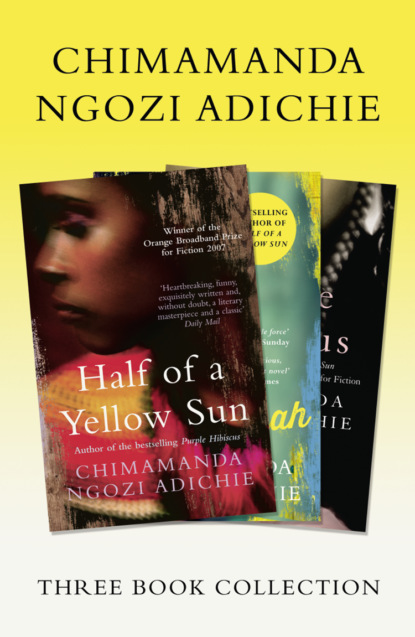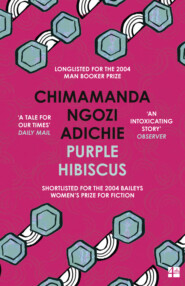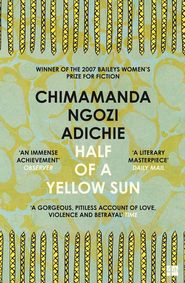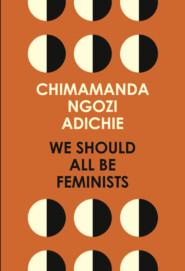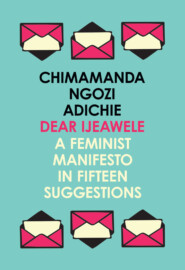По всем вопросам обращайтесь на: info@litportal.ru
(©) 2003-2024.
✖
Half of a Yellow Sun, Americanah, Purple Hibiscus: Chimamanda Ngozi Adichie Three-Book Collection
Автор
Год написания книги
2018
Настройки чтения
Размер шрифта
Высота строк
Поля
‘It will be very difficult to get tear gas,’ Harrison said.
‘Why?’
‘You are too young to know why.’ Harrison nodded mysteriously. ‘When you are a grown man I will tell you.’
Ugwu was puzzled at first, before he realized that Harrison did not know what tear gas was either but would never admit it. He was disappointed. He would have to ask Jomo.
Jomo knew what tear gas was and laughed long and hard when Ugwu told him what he wanted to use it for. Jomo clapped his hands together as he laughed. ‘You are a sheep, aturu,’ Jomo said finally. ‘Why do you want to use tear gas on a young girl? Look, go to your village, and if the time is right and the young girl likes you, she will follow you. You don’t need tear gas.’
Ugwu kept Jomo’s words in mind as Mr Richard drove him to his hometown the next morning. Anulika ran up the path when she saw them and boldly shook Mr Richard’s hand. She hugged Ugwu and, as they walked along, told him that their parents were at the farm, their cousin gave birth only yesterday, Nnesinachi left for the North last week –
Ugwu stopped and stared at her.
‘Has something happened?’ Mr Richard asked. ‘The festival hasn’t been cancelled, has it?’
Ugwu wished it had been. ‘No, sah.’
He led the way to the village square, already filling up with men and women and children, and sat under the oji tree with Mr Richard. Children soon surrounded them, chanting ‘Onye ocha, white man,’ reaching out to feel Mr Richard’s hair. He said, ‘Kedu? Hello, what’s your name?’ and they stared at him, giggling, nudging each other. Ugwu leaned against the tree and mourned the time he had spent thinking of seeing Nnesinachi. Now she was gone and some trader in the North would end up with his prize. He hardly noticed the mmuo: masculine figures covered in grass, their faces snarling wooden masks, their long whips dangling from their hands. Mr Richard took photographs, wrote in his notebook, and asked questions, one after another – what was that called and what did they say and who were those men holding back the mmuo with a rope and what did that mean – until Ugwu felt irritable from the heat and the questions and the noise and the enormous disappointment of not seeing Nnesinachi.
He was silent on the drive back, looking out of the window.
‘You’re already homesick, aren’t you?’ Mr Richard asked.
‘Yes, sah,’ Ugwu said. He wanted Mr Richard to shut up. He wanted to be alone. He hoped Master would still be at the club so he could take the Renaissance from the living room and curl up on his bed in the Boys’ Quarters and read. Or he would watch the new television. If he was lucky, an Indian film would be on. The large-eyed beauty of the women, the singing, the flowers, the bright colours, and the crying, were what he needed now.
When he let himself in through the back door, he was shocked to find Master’s mother near the stove. Amala was standing by the door. Even Master did not know they were coming, or he would have been asked to clean the guest room.
‘Oh,’ he said. ‘Welcome, Mama. Welcome, Aunty Amala.’ The last visit was fresh in his mind: Mama harassing Olanna, calling her a witch, hooting, and, worst of all, threatening to consult the dibia in the village.
‘How are you, Ugwu?’ Mama adjusted her wrapper before she patted his back. ‘My son said you went to show the white man the spirits in your village?’
‘Yes, Mama.’
He could hear Master’s raised voice from the living room. Perhaps a visitor had dropped by and he had decided not to go to the club.
‘You can go and rest, i nugo,’ Mama said. ‘I am preparing my son’s dinner.’
The last thing he wanted now was for Mama to colonize his kitchen or use Olanna’s favourite saucepan for her strong-smelling soup. He wished so much that she would just leave. ‘I will stay in case you need help, Mama,’ he said.
She shrugged and went back to shaking out black peppercorns from a pod. ‘Do you cook ofe nsala well?’
‘I have never cooked it.’
‘Why? My son likes it.’
‘My madam has never asked me to cook it.’
‘She is not your madam, my child. She is just a woman who is living with a man who has not paid her bride price.’
‘Yes, Mama.’
She smiled, as if pleased that he had finally understood something important, and gestured to two small clay pots at the corner. ‘I brought fresh palm wine for my son. Our best wine-tapper brought it to me this morning.’
She pulled out the green leaves stuffed in the mouth of one pot and the wine frothed over, white and fresh and sweet-smelling. She poured some into a cup and gave it to Ugwu.
‘Taste it.’
It was strong on his tongue, the kind of concentrated palm wine tapped in the dry season that made men in his village start to stagger too soon. ‘Thank you, Mama. It is very good.’
‘Do your people tap wine well?’
‘Yes, Mama.’
‘But not as well as my people. In Abba, we have the best wine-tappers in the whole of Igboland. Is that not so, Amala?’
‘It is so, Mama.’
‘Wash that bowl for me.’
‘Yes, Mama.’ Amala began to wash the bowl. Her shoulders and arms shook as she scrubbed. Ugwu had not really looked at her and now he noticed that her slender, dark arms and face were shiny-wet, as if she had bathed in groundnut oil.
Master’s voice, loud and firm, came from the living room. ‘Our idiot government should break ranks with Britain too. We must take a stand! Why is Britain not doing more in Rhodesia? What bloody difference will limp economic sanctions make?’
Ugwu moved closer to the door to listen; he was fascinated by Rhodesia, by what was happening in the south of Africa. He could not comprehend people that looked like Mr Richard taking away the things that belonged to people that looked like him, Ugwu, for no reason at all.
‘Bring me a tray, Ugwu,’ Mama said.
Ugwu brought down a tray from the cupboard and made as if to help her serve Master’s food, but she waved him away. ‘I am here so you can rest a little, you poor boy. That woman will start overworking you again once she returns from overseas, as if you are not somebody’s child.’ She unwrapped a small packet and sprinkled something into the soup bowl. Suspicion flared in Ugwu’s mind; he remembered the black cat that appeared in the backyard after her last visit. And the packet was black, too, like the cat.
‘What is that, Mama? That thing you put in my master’s food?’ he asked.
‘It is a spice that is a specialty of Abba people.’ She turned to smile briefly. ‘It is very good.’
‘Yes, Mama.’ Maybe he was wrong to think she was putting her medicine from the dibia in the master’s food. Maybe Olanna was right and the black cat meant nothing and was only a neighbour’s cat, although he did not know any of the neighbours who had a cat like that, with eyes that flashed yellow-red.
Ugwu didn’t think again of the strange spice or the cat because, while Master had dinner, he sneaked a glass of palm wine from the pot and then another glass, since it was so sweet, and afterwards he felt as if the inside of his head was coated in soft wool. He could hardly walk. From the living room, he heard Master say in an unsteady voice, ‘To the future of great Africa! To our independent brothers in the Gambia and to our Zambian brothers who have left Rhodesia!’ followed by laughter in wild bursts. The palm wine had got to Master as well. Ugwu laughed along, even though he was alone in the kitchen and did not know what was funny. Finally, he fell asleep on the stool, his head against the table that smelt of dried fish.
He woke up with stiff joints. His mouth tasted sour, his head ached, and he wished the sun were not so oppressively bright and that Master would not speak so loudly over the newspapers at breakfast. Howcan more politicians return unopposed than elected? Utter rubbish! This isrigging of the worst order! Each syllable throbbed inside Ugwu’s head.
After Master left for work, Mama asked, ‘Will you not go to school, gbo, Ugwu?’
‘We are on holiday, Mama.’
‘Oh.’ She looked disappointed.
Later, he saw her rubbing something on Amala’s back, both of them standing in front of the bathroom. His suspicions returned. There was something wrong about the way Mama’s hands were moving in circular motions, slowly, as if in consonance with some ritual, and about the way Amala stood silent, with her back straight and her wrapper lowered to her waist and the outline of her small breasts visible from the side. Perhaps Mama was rubbing a potion on Amala. But it made no sense because if Mama had indeed gone to the dibia, the medicine would be for Olanna and not Amala. It may be, though, that the medicine worked on women and Mama would have to protect herself and Amala to make sure that only Olanna died or became barren or went mad. Perhaps Mama was performing the preliminary protections now that Olanna was in London and would bury the medicine in the yard to keep it potent until Olanna came back.
Ugwu shivered. A shadow hung over the house. He worried about Mama’s cheeriness, her tuneless humming, her determination to serve all of Master’s meals, her frequent hushed words to Amala. He watched her carefully whenever she went outside, to see if she would bury anything, so he could unearth it as soon as she went back indoors. But she did not bury anything. When he told Jomo that he suspected Mama had gone to a dibia to find a way to kill Olanna, Jomo said, ‘The old woman is simply happy to have her son to herself, that is why she is cooking and singing every day. Do you know how happy my mother is when I go to see her without my wife?’





